
|
 |
 |
Selected Longer Reviews
Nowhere Man
|
By Hemon, Aleksandar
|
Nan A. Talese, New York,
2002,
Price: 15.99 Pound Sterling
Shelf mark: 891.8'54 [F]
|
Haunted by the present
by Maya Jaggi
The engagingly gauche, drolly unforgettable Jozef Pronek first appeared in Aleksandar Hemon's impressive debut collection of stories, The Question of Bruno (2000). Like Hemon, the hapless Bosnian was visiting Chicago in 1992 when the siege of Sarajevo blocked his return. Through the immigrant Pronek's despairing entry into the lower depths of the US labour market, and his sharpening awareness of death as the Bosnian war unfolds on CNN, Hemon probed ‘how easy it was to become someone else, a complete stranger to oneself’.
Nowhere Man, Hemon's first novel, amplifies the adventures of this anti-heroic alter ego. Moving back and forth in time and between countries, it obliquely glimpses Jozef Pronek through various narrators' eyes. In the opening section, ‘Passover’, a fellow Bosnian, who also arrived in Chicago on the eve of war, recognizes Pronek in an English class two years later. He pieces together Pronek's past life, from his Sarajevo birth in 1967 to army service and playing in a Beatles cover band.
A Ukrainian-American, Viktor Plavchuk, takes up the story as Pronek's one-time roommate at summer school in Kiev in 1991, when George Bush Snr came to visit and the Soviet Union collapsed. A Shakespeare scholar stalled over a thesis on ‘Queer Lear’, Plavchuk falls in love with the oblivious Pronek.
After a letter from Pronek's friend Mirza, on grim stretcher duty in Bosnia in 1995, Pronek's tale unfolds almost through his own eyes, with an unnamed narrator as intimate as a reflection - Pronek ‘oblivious to me as a wall is oblivious to a shadow dancing on it’. Haunted by headlines of ‘Thousands killed in Srebrenica’, Pronek piles on weight and has visions of a massacre triggered by the sound of a staple gun next door. While he hates the standard question about whether he is Muslim (‘I am complicated’), he explains: ‘Some Serbs try to kill the Muslims in Sarajevo and Bosnia, and also the people who don't want to kill the Muslims.’
Pronek's spell as a door-to-door fundraiser for Greenpeace wins him an American girlfriend, Rachel, and elicits some of the novel's most hilarious dialogue. It also hastens anger and breakdown in the polite, forever apologetic Bosnian.
Hemon, who famously arrived in the US with phrasebook English but whose writing soon drew comparisons with Nabokov, has a wide stylistic range and an acute ear for register. He plumbs the desolate estrangement from the self that comes with having to operate in a foreign tongue. Comedy and pathos arise from the gulf between Pronek's inner life and his means of expressing it. Infuriated by a drunk cursing outside his window, he rehearses killer put-downs only to shout, ‘That is not polite.’ ‘What do you do in you life?’ is an innocently inept gambit that invariably brings a rebuff: ‘Do you Balkan boys always ask questions like that?’ While Viktor peppers his American speech with Shakespearean quotations, Pronek shoehorns complex thoughts into stilted or broken English. As others correct his speech - sometimes wrongly (‘Went. You say I should have went the other way’) - Pronek appears obtuse, yet is a philosopher trapped in an alien language.
Viktor hated his Ukrainian father ‘for being a fucking foreigner: displaced, cheap and always angry’, while Rachel's Auschwitz survivor grandfather ‘exuded the scent of European death and sickness, the fetid refugee smell’. Pronek is painfully aware of his similar status and vulnerability, and of himself as a spectacle. A stand-up comic hopes to pick up his accent ‘for an improv routine’, while as Pronek trashes Rachel's apartment in tormented rage, she reaches for her camera. Yet much of the humour is directed at himself. In a throwaway line, Pronek has a crushing wake-up call that the Beatles (Pronek's favourite song gives the book its title) are not as cool as they were in 1980s Sarajevo: ‘Man, how old are you - 67?’
A coda about Evgenij Pick, an actor, spy and multiple turncoat in the first half of the 20th century, hints at how displacement can spawn multiple selves and nightmarish alienation. In Pronek there are echoes of Kafka's Josef K and Dostoyevsky's saintly fool Prince Myshkin (infuriated by pedants, Pronek hurls a copy of The Idiot, screaming, ‘Correct this!’). Just as the migrant may be a metaphor for modern man, Nowhere Man is, in some sense, Everyman.
Despite an initial sense that the material of the short story has been overstretched, the novel startles with the gift of making us see the mundane world anew through language. A toilet bowl is ‘agape’, dissolving toilet paper in it ‘throbbing like a jellyfish’. What seem to be occasional slips are more often the author reclaiming archaisms from the dictionary: ‘minikin’ (small and delicate), ‘sough’ (a soft rustling, like wind in the trees).
Confirmed by this book as a master of economy and observation, Hemon gives the impression that he is still absorbing styles, still flexing; that delightful and accomplished as this novel is, those he has yet to write will be astonishing.
This review appeared in The Guardian (London), 28 June 2003
Back to Books on Bosnia

|
|
 |

Books on
Bosnia:A database of 379 book reviews and 3741 books held by the Institute:
|
|